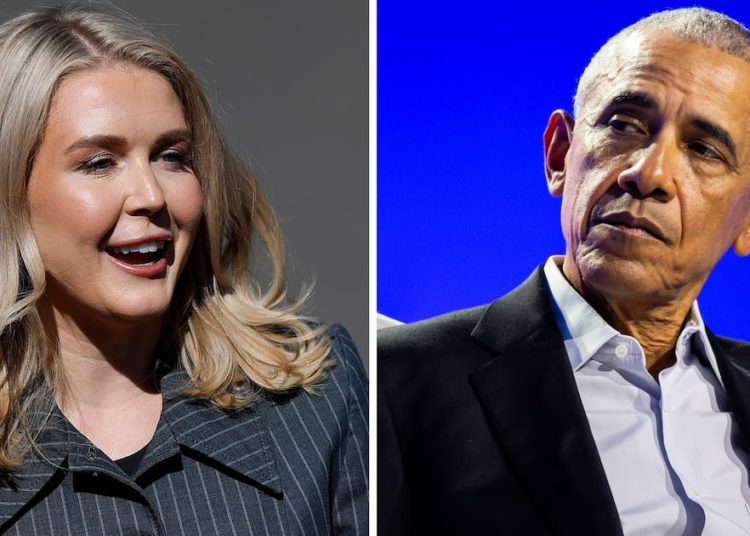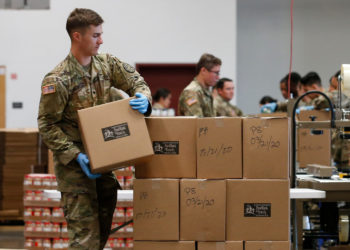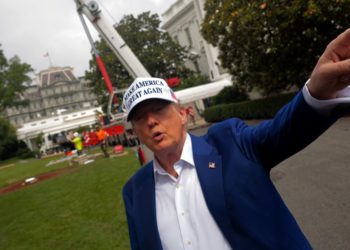On Tuesday night, Larry David told an Upper West Side crowd at the Beacon Theater that he was a popular dinner party guest because he never stayed too long, always leaving seven minutes after dessert was served.
It might be why he started to get a little concise in the last stage of an evening billed as “A Conversation With Larry David,” after inviting audience questions in a tone of distinct ambivalence. He waved off a query about artificial intelligence and pleaded ignorance to another about comic ideas he never used. To a question about the origin of a “Seinfeld” episode he worked on, he shrugged: “It was 1992.”
Then a young man, who looked like he might not have been alive when “Seinfeld,” the sitcom David helped create, ended its run in 1998, took a different tack, telling David that his neighbors put up Halloween decorations in September. Leaning forward in his white swivel chair, David shouted back, “You should egg their house!” Suddenly, David perked up, excitably, gesticulating with Three Stooges physicality about the transgression of getting ready for a holiday too early. “Unacceptable,” he said, then added that they should take down the decorations the day after Halloween.
The Beacon Theater crowd roared in delight. This was the irascible, unreasonable comic irritation they had come for (and, in some cases, paid more than $800 for on the ticket resale market). It’s been more than a year and a half since the final episode of “Curb Your Enthusiasm,” the follow-up sitcom he created and starred in, and if the reaction to this minor eruption is any indication, it is badly missed.
David has kept a mostly low profile, appearing on talk shows and podcasts and writing a few comic essays, like his satirical “My Dinner With Adolf,” which skewered the naïveté and self-involvement of Bill Maher reporting back on the charm of President Trump after a private meeting. When David mentioned Cheryl Hines — the actress whom he cast as his wife on “Curb” and who is now married to Robert F Kennedy Jr., the controversial secretary of health and human services — he smiled and looked as if he wanted to say something irreverent. He didn’t.
The evening had the buzz of anticipation because, for nearly four decades, comedy fans could count on the prospect of some refined comic kvetching from David on television. No longer.
In a recent memoir, Larry Charles, who worked on both “Seinfeld” and “Curb” with David, describes making a revealing documentary about David that dug into his thoughts on death and religion. He said this was a version of David you had not seen before, a more emotional one. The project was shelved. What David presented here was something more like the guy you see in interviews: guarded, improvisational, impatient.
Prompted by the moderator, the NBC anchor Willie Geist, who appeared on the last season of “Curb,” David told well-worn stories about his childhood in the Sheepshead Bay neighborhood of Brooklyn and his early New York stand-up days, along with the well-known anecdote about quitting as a writer on “Saturday Night Live” that he turned into a “Seinfeld” episode.
No one in this hometown crowd seemed to mind hearing these again. When David described telling his mother that he wanted to be a comedian and she responded by saying he’d never made her laugh once, the woman sitting behind me said, “I could totally hear her saying that.”
David promoted a new book on “Curb Your Enthusiasm,” and he spent most of his time describing behind-the-scenes details, like how he took the “Curb” theme music from a local bank commercial, and how he used it as a way to indicate to the audience to take nothing too seriously. More surprisingly, he revealed that his recurring bit where he and a rival character stare at each other intently was inspired by George W. Bush’s description of meeting President Vladimir V. Putin of Russia. The American leader said he “looked into his eyes and saw his soul.”
David also described casting Susie Essman after seeing her on a roast. (Essman later joined him onstage for a few questions). David recently signed a deal to return to television, writing and starring in a sketch comedy show, produced by the Obamas’ production company. But he mentioned nothing about that project.
At one point, Geist asked David that chestnut about the difference between the Larry David onscreen and the real one. David said that he wished he was the guy onscreen, that he admired how he just said whatever he wanted without concern for social nicety. “He’s my hero,” David said, adding, “I’m getting closer to him every day.”
Jason Zinoman is a critic at large for the Culture section of The Times and writes a column about comedy.
The post Larry David Takes the Stage for an Amusing but Not-So-Revealing Chat appeared first on New York Times.




